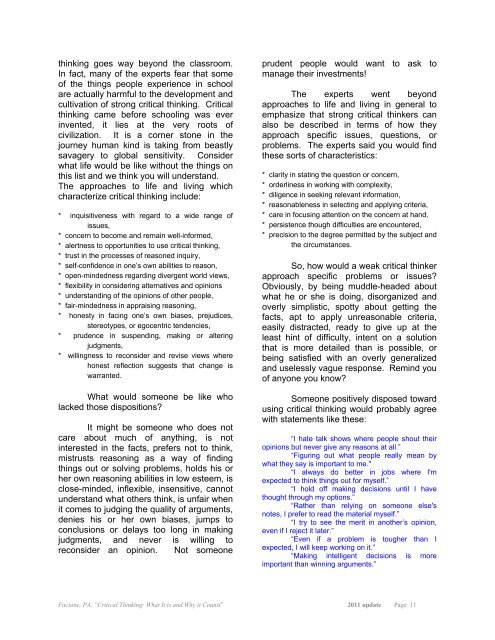Critical Thinking for Transformative Justice
Critical Thinking for Transformative Justice
Critical Thinking for Transformative Justice
You also want an ePaper? Increase the reach of your titles
YUMPU automatically turns print PDFs into web optimized ePapers that Google loves.
thinking goes way beyond the classroom.<br />
In fact, many of the experts fear that some<br />
of the things people experience in school<br />
are actually harmful to the development and<br />
cultivation of strong critical thinking. <strong>Critical</strong><br />
thinking came be<strong>for</strong>e schooling was ever<br />
invented, it lies at the very roots of<br />
civilization. It is a corner stone in the<br />
journey human kind is taking from beastly<br />
savagery to global sensitivity. Consider<br />
what life would be like without the things on<br />
this list and we think you will understand.<br />
The approaches to life and living which<br />
characterize critical thinking include:<br />
* inquisitiveness with regard to a wide range of<br />
issues,<br />
* concern to become and remain well-in<strong>for</strong>med,<br />
* alertness to opportunities to use critical thinking,<br />
* trust in the processes of reasoned inquiry,<br />
* self-confidence in one’s own abilities to reason,<br />
* open-mindedness regarding divergent world views,<br />
* flexibility in considering alternatives and opinions<br />
* understanding of the opinions of other people,<br />
* fair-mindedness in appraising reasoning,<br />
* honesty in facing one’s own biases, prejudices,<br />
stereotypes, or egocentric tendencies,<br />
* prudence in suspending, making or altering<br />
judgments,<br />
* willingness to reconsider and revise views where<br />
honest reflection suggests that change is<br />
warranted.<br />
What would someone be like who<br />
lacked those dispositions?<br />
It might be someone who does not<br />
care about much of anything, is not<br />
interested in the facts, prefers not to think,<br />
mistrusts reasoning as a way of finding<br />
things out or solving problems, holds his or<br />
her own reasoning abilities in low esteem, is<br />
close-minded, inflexible, insensitive, cannot<br />
understand what others think, is unfair when<br />
it comes to judging the quality of arguments,<br />
denies his or her own biases, jumps to<br />
conclusions or delays too long in making<br />
judgments, and never is willing to<br />
reconsider an opinion. Not someone<br />
prudent people would want to ask to<br />
manage their investments!<br />
The experts went beyond<br />
approaches to life and living in general to<br />
emphasize that strong critical thinkers can<br />
also be described in terms of how they<br />
approach specific issues, questions, or<br />
problems. The experts said you would find<br />
these sorts of characteristics:<br />
* clarity in stating the question or concern,<br />
* orderliness in working with complexity,<br />
* diligence in seeking relevant in<strong>for</strong>mation,<br />
* reasonableness in selecting and applying criteria,<br />
* care in focusing attention on the concern at hand,<br />
* persistence though difficulties are encountered,<br />
* precision to the degree permitted by the subject and<br />
the circumstances.<br />
So, how would a weak critical thinker<br />
approach specific problems or issues?<br />
Obviously, by being muddle-headed about<br />
what he or she is doing, disorganized and<br />
overly simplistic, spotty about getting the<br />
facts, apt to apply unreasonable criteria,<br />
easily distracted, ready to give up at the<br />
least hint of difficulty, intent on a solution<br />
that is more detailed than is possible, or<br />
being satisfied with an overly generalized<br />
and uselessly vague response. Remind you<br />
of anyone you know?<br />
Someone positively disposed toward<br />
using critical thinking would probably agree<br />
with statements like these:<br />
“I hate talk shows where people shout their<br />
opinions but never give any reasons at all.”<br />
“Figuring out what people really mean by<br />
what they say is important to me."<br />
“I always do better in jobs where I'm<br />
expected to think things out <strong>for</strong> myself.”<br />
“I hold off making decisions until I have<br />
thought through my options.”<br />
“Rather than relying on someone else's<br />
notes, I prefer to read the material myself.”<br />
“I try to see the merit in another’s opinion,<br />
even if I reject it later.”<br />
“Even if a problem is tougher than I<br />
expected, I will keep working on it.”<br />
“Making intelligent decisions is more<br />
important than winning arguments.”<br />
Facione, PA, “<strong>Critical</strong> <strong>Thinking</strong>: What It is and Why it Counts” 2011 update Page 11

















